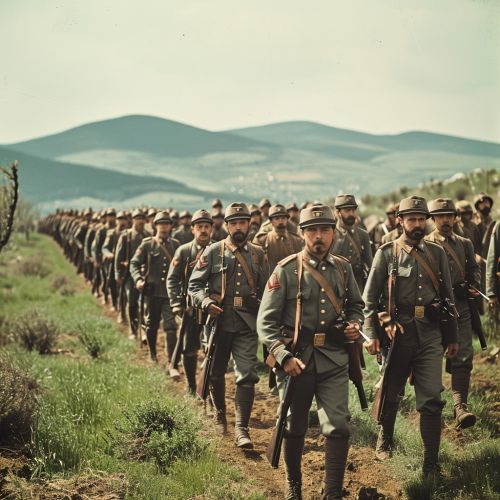First Balkan War
Background
The First Balkan War was a conflict that took place in the Balkan Peninsula from October 1912 to May 1913. It was fought between the Balkan League, consisting of Bulgaria, Greece, Montenegro, and Serbia, against the Ottoman Empire. The war was a result of the nationalistic and territorial ambitions of the Balkan states, which were emboldened by the weakening Ottoman Empire. The war ended with the Treaty of London, which led to significant territorial gains for the Balkan League but also set the stage for the Second Balkan War.


Causes of the War
The First Balkan War was primarily caused by the nationalistic aspirations of the Balkan states, who sought to liberate and unite the territories inhabited by their ethnic kin under Ottoman rule. The decline of the Ottoman Empire and its inability to effectively control and govern its vast territories provided an opportunity for the Balkan states to realize their ambitions.
The Balkan League, an alliance formed by Bulgaria, Greece, Montenegro, and Serbia, was a significant factor in the outbreak of the war. The League was formed with the explicit purpose of driving out the Ottomans from Europe and dividing their European territories among themselves. The League was a result of diplomatic efforts by Russia, which sought to weaken the Ottoman Empire and increase its own influence in the region.
Course of the War
The war began on 8 October 1912, when Montenegro declared war on the Ottoman Empire. The other members of the Balkan League followed suit shortly after. The Balkan League had a significant advantage in terms of numbers and was able to quickly gain ground against the Ottoman forces.
The war was characterized by a series of battles and sieges, with the Balkan League forces generally gaining the upper hand. The Battle of Kirk Kilisse, the Battle of Lule Burgas, and the Siege of Adrianople were among the key engagements of the war. The war also saw the use of modern military technology, such as quick-firing artillery and machine guns, which contributed to the high casualty rates.
The war ended with the signing of the Treaty of London on 30 May 1913. The treaty recognized the independence of Albania, a significant territorial loss for the Ottomans. The remaining Ottoman territories in Europe were divided among the members of the Balkan League.
Aftermath and Impact
The aftermath of the First Balkan War was marked by dissatisfaction among the victors over the division of spoils. Bulgaria was particularly dissatisfied with the territorial gains, which led to the outbreak of the Second Balkan War.
The war had a significant impact on the geopolitical landscape of the region. It marked the end of Ottoman rule in most of Europe and led to the emergence of new states. It also changed the balance of power in the region and set the stage for the future conflicts, including the World War I.
The war also had a significant humanitarian impact, with a high number of casualties and widespread displacement of populations. It also led to significant changes in the ethnic composition of the region, with many areas experiencing ethnic cleansing and population exchanges.
